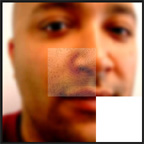:: Monday, October 11, 2004 ::

NEW WRITING: A review of “Nine” created by Cyber author Jason E. Lewis
BY: Kerry Singh
“Nine” has it’s artwork based over a nine tile split puzzle which has an empty square the user may slide a tile into.
The content within is of a dynamic poem which transcends time and space both orally and visually to deliver a story of many lives within one to deliver the viewer into their own transcendency or frustration at not having been able to solve the puzzle. I spent a few hours interacting with “Nine” and found the visual content constantly changing.
Each tile square presents different imagery the longer you hold your mouse clicked over it, which presents the difficulty of piecing together one image from a wholly unknown and possibly infinite amount of images which change and present themselves each time you touch a square.
The artist’s creation story for this piece revolves about a couple - an Indian woman and an Islander man have a brown baby which is then raised by a white couple. It was created by Jason E. Lewis for display at the CyberPowWow site in relation to an exhibition they’ve displayed online to examine where native meets non-native.
Within Jason E. Lewis’s piece the imagery is quite stunning and colourful. The use of pieces of map show us a mixed path that this life has taken, hand written pieces of a letter show us a personal side to the issue he’s taken. There are broken pieces of a baby photo dispersed within the imagery, these are hard to come across. There are other pieces of photo which have to been hard to make out due to the small size of the pieces and that the image itself has been modified with effects to display a kind of solarised or drawn image with brighter colours on a black background.
The other two main effects of the imagery I came across with “Nine” show a combination of nature and a traditional western European style of housing. Showing the heritage the writer displays within his story. Natively, his birth parents – Islander by Indian then raised by his white family. The author suggests his heritage and growth in these circumstances has enabled him to be native any where, in any country. However, I believe it’s that he feels that he almost stands alone emotionally, though is surrounded by a loving family which represent three parts of the globe.
I wholly suggest the viewer reading here to take a wander through “Nine” where Jason E. Lewis has created a stunning, emotional dynamic piece of visual and written poetry to capture both his feelings and those of the people about him. In his own words Jason E. Lewis describes his artwork as:
“the story of a simple mountain boy.”
I rate this piece with a four of five stars. The story is simple and brief in it’s telling with text, but you’ll eventually read the story several times while working you’re way through the large amounts of imagery cleverly placed throughout.
----------------------------------------------------
http://www.cyberpowwow.net/jl.html
Created 2001 by Jason E. Lewis for Exhibition: CyberPowWow 2002.
Posting courtesy of writer Kerry Singh

ORIGINAL POST: Thursday, September 16, 2004
BY: Ana Boa-Ventura
Eduardo’s post earlier this week (read below under September 13 ) brings up an interesting question. Is Art – and more specifically, “new media” Art – less considered in the US than in South America (and Europe)?. This would be extraordinary as we (I am European myself) and the South –Americans believe the opposite and have for long envied the North American opportunities for exhibitions and art shows.
Eduardo’s post made me think of my own experience with the South American support for the arts. In September 2001 I was struggling with long lines at the airport to fly to Caracas, where I was to speak at a conference about globalization and its consequences to Latin-American new media artists. I was hosted in a 5 star hotel (just like Eduardo), and with a wonderful honorarium in my pocket, since I received it on the first day of my stay, as opposed to a couple of weeks/months later as it often is the case. The event was the “X curso de gerencia en las artes” (Xth course of Arts Management, although the term “gerencia” is difficult to translate accurately in this context) the tenth of a series promoted by Fundacion Polar. Graziela Pantin did a particularly amazing work in organizing those editions she was involved with. The Xth edition looked specifically at emerging technologies. The organization was flawless. My amazement at the funding available in this field continued as I heard Ricardo Benaim, a Venezuelan artist who with me presented the panel on globalization and its implications for the Latin-American new media artists. Benaim talked about the “proyecto MAPA” that I wrote about before under the title "Meantime in Caracas..." here , which allowed dozens of artists from Venezuela and Colombia to interact and travel between both countries (travel expenses paid). So NY – based artist Lew Baldwin (his work here ), and myself, along with other North Americans (other than Lew, I mean, as I am Portuguese…) were just perplexed at how very high the Venezuelan government seemed to consider this field. Now, opinions on Chavez are (very) antagonistic and it is not clear how the relatively new government will fund cultural institutions such as Fundacion Polar. But this is beyond the scope of this piece. What I am asking is: has the US – even prior to 9/11 – been a true supporter of the Arts? And I am not talking NGOs here... but rather wondering whether there is a clear US governmental policy in this domain, since there seem to be clear policies in other domains…

ORIGINAL POST: Thursday, September 30, 2004
BY: Lora McPhail
Rosalind, (named for geneticist Rosalind Franklin), is a dynamic [new media art] lexicon that developed from a private project called GEST@TION. The endeavor, begun in January 2004, is the accumulation of words and their definitions over a period of nine months by its originators, a small network of independent collaborators who sought to “evolve a new shared textual vocabulary for communicating what they are, what they do and the worlds they are creating.”
In September 2004 the lexicon and the ability to add one’s definitions to it were made public. The intent being that multiple users would submit terminology, jargon and colloquialisms from their areas of interest and expertise – “Feed Rosalind with your own words and definitions to express and declare what you are, what you do and the worlds you create, on your own terms.” Guidelines for additions are as follows: Submit words that describe something very particular to your life/experience/work; that have been invented in a moment of desperation; that arise in conversation with others; or that are already in circulation. Any entity submitting a term should embed the definition in a web page on its own site, so the term can then be referenced in a public location.
In its descriptions, Rosalind has been characterized as a sort of being, whose development follows the life cycle of a human being. Terms such as “conceived,” “gestation,” “nascent,” and “born” belie the fact that this project is very much the baby of its collaborative team. As such I will try to be careful. However, if it is our goal to “help Rosalind to maturity,” then there will need to be some growing pains in the process. I am a lover of language. I love words and the playful slippages that allow for elided forms to convey more meaning in their collision than in their discrete totalities. I am, however, suspicious of lexicons and catalogs, which despite their inclusive and egalitarian intentions can become fascistic by virtue of their [necessarily] formal structure. However, this practice can often become opaque, burying any useful discourse under a barrage of semantics and word play.
My further concern is that there is a historical tradition [Western] that ties the concept of “naming” to the process of legitimization. For illustration, a child that was born out of wedlock was denied the use of his father’s name and was thus bastardized or considered illegitimate. By extension, language has become a way of legitimizing any object or idea by creating sharable context and meaning. Further, areas of thought that find their authority on the margins, often a have a directed desire to produce the language that will tell the story of their movement, rather than produce the movement itself. I find a disconcerting trend in new media to coin terms and claim ownership of their origination. This seems more a means of marking intellectual territory than in developing the field of study. Nor do I understand why there is such eagerness to assume the same processes and forms of traditional media, which we could manage to avoid and surpass, (at least for the purposes of our own field).
Rosalind is tentatively pleasurable, but many of the definitions it has gathered to date are so highly subjective that they are limited to a single, momentary use. Some are simply jokes in the form of structural puns derived from the project itself. Others are totally meaningless. Yet a few are truly inspiring and relevant, and I plan to use them often. A few favorites terms are: aeremonial; Alpha Revisionism; anti-archive; catechstrophy; decontentdrated; defuge; emulationism; intertwingle; leibor and loiber; miscourse; multivating; and wapathy. (You will need to visit Rosalind for these and other definitions.)
My hope is that as the Rosalind database develops, it will function as a significant and comprehensive linguistic reflection rather than gesturing towards catalog, and that its dynamism will be actual, not theoretical.